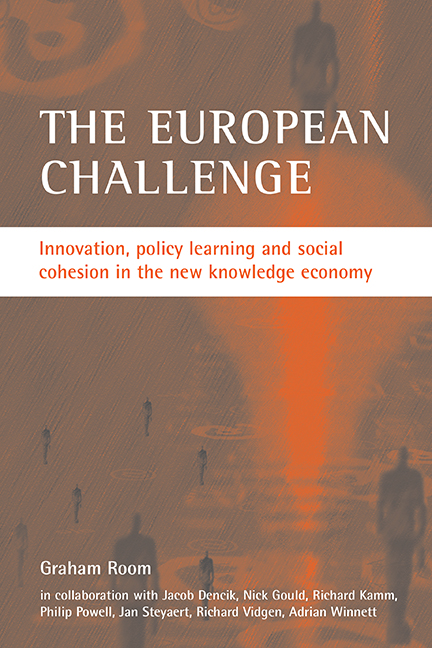Book contents
- Frontmatter
- Contents
- List of figures and tables
- Preface
- one The new knowledge-based economy
- two The EU response
- three Growth and stability
- four Dynamics and innovation
- five Enterprise and organisational change
- six Human investment and learning
- seven Social cohesion and inclusion
- eight Models and measurement
- nine Benchmarking and governance
- ten Globalisation and the knowledge economy
- Endnotes
- References
- Index
four - Dynamics and innovation
Published online by Cambridge University Press: 18 January 2022
- Frontmatter
- Contents
- List of figures and tables
- Preface
- one The new knowledge-based economy
- two The EU response
- three Growth and stability
- four Dynamics and innovation
- five Enterprise and organisational change
- six Human investment and learning
- seven Social cohesion and inclusion
- eight Models and measurement
- nine Benchmarking and governance
- ten Globalisation and the knowledge economy
- Endnotes
- References
- Index
Summary
Introduction
The Lisbon Summit recognised that in order to develop a knowledgebased economy, the member states of the EU would need to accelerate the pace of innovation. This would require structural reform but it could also be promoted by pooling best practice and by transferring technological and organisational know-how from the leading international performers. Benchmarking for purposes of policy learning and innovation is therefore at the heart of the Lisbon agenda.
However, innovation performance has been markedly uneven across the EU member states, and even more so at regional level (which will be shaped in part by the national innovation system within which it is embedded: see below and European Commission, 2002b; 2003c). These questions have become yet more pressing with EU enlargement. Several studies have already identified wide discrepancies in the transition economies’ likely capacity for, and responsiveness to, knowledge-based innovation (Piech, 2003; EITO 2004, pp 72-90).
One of our concerns is to identify indicators that policy makers can use to steer and shape these dynamic processes: indicators which may enable the sort of benchmarking for policy learning that Lisbon advocates. Indicators may not be sufficient for such policy learning but they are arguably necessary. We search in particular for indicators which might serve to identify points of leverage – triggers and catalysts – which will send a country or sector along a golden trajectory of socio-economic development (by whomsoever this is defined) or at least steer it away from stagnation and decline.
The risks and opportunities posed by technological advances in the ICT sector arise at least as much from the global as from the national or European economy. As enterprises and other actors develop inventive responses to these technological advances, they draw upon practices and resources internationally, through high tech trade and recruitment of IT specialists in a global market. The indicators which we seek for purposes of benchmarking and policy learning must therefore make reference to national, European and international levels of development.
Mainstream economics does not cope well with the processes of dynamic innovation and cumulative change that would appear to characterise the new knowledge-based economy. The first task of this chapter is therefore to develop a better understanding of the linkages between innovation and macroeconomic processes. This will draw on a wider array of disciplinary traditions, which we draw together in eclectic fashion.
- Type
- Chapter
- Information
- The European ChallengeInnovation, Policy Learning and Social Cohesion in the New Knowledge Economy, pp. 29 - 48Publisher: Bristol University PressPrint publication year: 2005



